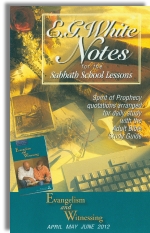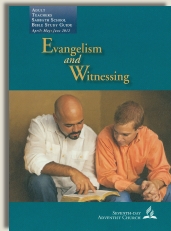|
||||||||||||||
Commentary on "Releasing Into Ministry"
Day 5: Wednesday, May 30, 2012 - Spiritual Growth Through Ministry Involvement
Overview
The Lesson asks, “How can a person seeking truth be sure when the genuine has been found?” That is a profoundly important question, and the Lesson directs us to John 7:17, where Jesus said,
“If anyone’s will is to do God’s will, he will know whether the teaching is from God or whether I am speaking on my own authority.”
The Lesson interprets these words to mean, “Those who are willing to do God’s will can know if a doctrine is, or is not, of God.” More generally stated, those who are obedient to the ten commandments will be led into doctrinal truth. Is that what Jesus is saying in John 7?
Observations
To understand the 17th verse, let’s look closely at the context, starting in verse 14:
“About the middle of the feast, Jesus went up into the temple and began teaching. The Jews therefore marveled, saying, “How is it that this man has learning, when he has never studied?” So Jesus answered them, “My teaching is not mine, but his who sent me. If anyone’s will is to do God’s will, he will know whether the teaching is from God or whether I am speaking on my own authority. The one who speaks on his own authority seeks his own glory, but the one who seeks the glory of him who sent him is true, and in him there is no falsehood.” John 7:14-18
The focus of this entire chapter, John 7, is not on law-keeping but the credibility of Jesus’ testimony. The unbelieving crowd is impressed with His learned teaching, but skeptical about His claims. They judged Him by superficial appearances but not with “right judgment” (vs. 24). Jesus answers their question, and ours, about how we know what is true. He said, “The one who seeks the glory of him who sent him is true” (vs. 18). First of all, the text tells us that knowing truth comes by knowing and believing a person, Jesus. If we don’t know Him, we will have deep problems with the truth.
Secondly, we must believe Him to be a completely trustworthy source of truth. We can trust His words because He seeks the Father’s glory, not His own. If He were self-exalting, He would not be trustworthy, nor the Son of God. This is not natural for us to accept as true. We want a way to finding truth that exalts us, not God, and confirms our goodness and worth. As religious people, we naturally want to believe that God will show us greater truths as a reward for good Sabbath-keeping, or some other good behavior. But that was not what Jesus told this crowd of hostile Sabbath-keepers. His answer seems very rude (vs. 19): “Has not Moses given you the law? Yet none of you keeps the law. Why do you seek to kill me?” This crowd hated Him because He exposed even their best works as evil (vs. 7).
Jesus’ words do the same for us today. They expose our deepest troubles: our dead works, our profound hostility to our ugly inner truth, our profound lusts for glory, and our deep natural hatred of Jesus. When He speaks to us, we won’t will what He wills, because we can’t. We cannot submit to Him or His laws (Rom. 8:7-8). We can wish to kill Him as they did, or we can be born of the Spirit and submit to His authority over our wills.
Many religious people are not born of the Spirit, and their wills are hostile to God’s commands. They might make an impressive show of superficially good commandment-keeping, but their works come from a heart of rebellion. They use God’s law to glorify themselves, making the Ten Commandments an instrument of evil. That is what I did, and it is the natural state of all of us who grew up religious. How do we change our rebellious wills and begin to exalt God instead of ourselves? Not by stronger acts of self-will and obedience, for that only digs our holes deeper. We must fling ourselves on His words, words that we can trust, and ask for Him to change our defective wills. If you see yourself as willful and rebellious, then that is evidence that His Spirit is already drawing you to Him!
So how do we find the genuine Truth? Truth is a Person (John 14:6). You won’t learn anything important about Jesus through good law-keeping. When we trust in Jesus who promised to reveal Himself through the power of His word, we learn of Him. He made Himself a servant to glorify His Father and give His life for us. For that, we can trust His words and feed on them often, like the best bread we ever ate, so they can give us life.
“It is the Spirit who gives life; the flesh is no help at all. The words that I have spoken to you are spirit and life” (John 6:63).
Copyright 2012 BibleStudiesForAdventists.com. All rights reserved. Revised May 31, 2012. This website is published by Life Assurance Ministries, Camp Verde, Arizona, USA, the publisher of Proclamation! Magazine. Contact email: BibleStudiesForAdventists@gmail.com.
The Sabbath School Bible Study Guide and the corresponding E.G. White Notes are published by Pacific Press Publishing Association, which is owned and operated by the Seventh-day Adventist church. The current quarter's editions are pictured above.
Official Adventist Resources
Standard Edition Study Guide Week 9
Teacher's Edition Study Guide Week 9
Easy Reading Edition Study Guide Wk 9
Search the Complete Published Ellen G. White Writings
Please Support This Project


